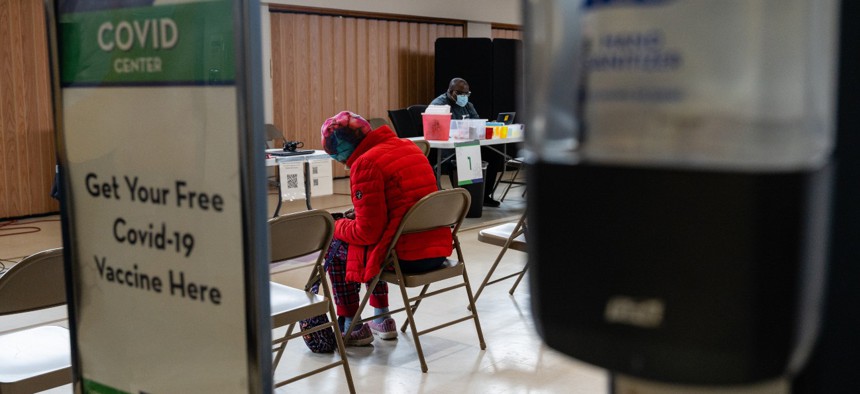
A woman fills out a registration form to receive a dose of a Covid-19 vaccination in Washington, D.C. in March. HHS has announced a plan to keep offering free vaccines to the uninsured after the COVID-19 public health emergency ends. Eric Lee for The Washington Post via Getty Images
Coronavirus Roundup: Vaccines for the Uninsured; Additional Shots for Certain Groups
There’s a lot to keep track of. Here’s a list of this week’s news updates and stories you may have missed.
Major law enforcement actions targeting COVID-19 health care fraud were announced on Thursday.
The Justice Department announced criminal charges against 18 defendants across the country for their alleged participation in various COVID-19 health care fraud schemes that allegedly resulted in over $490 million in false billings and theft from federal programs. In connection with this, the department seized over $16 million in cash and other proceeds.
“Today’s announcement marks the largest-ever coordinated law enforcement action in the United States targeting health care fraud schemes that exploit the COVID-19 pandemic,” said Assistant Attorney General Kenneth Polite Jr., of the Justice Department’s Criminal Division.
Justice also noted separately on Thursday that the Centers for Medicare & Medicaid Services took adverse administrative actions in the past year against 28 medical providers for alleged involvement in pandemic fraud schemes.
“I am proud of the successful partnership of the CMS, the Department of Justice, and the U.S. Department of Health and Human Services Office of Inspector General to combat fraud, waste, and abuse in federal programs,” CMS Administrator Chiquita Brooks-LaSure said. “It is particularly offensive to discover individuals who took advantage of the pandemic to defraud the government.” Here are some of the other recent headlines you might have missed.
The Homeland Security Department identified “emerging infectious diseases” as one of the evolving challenges for the department’s mission in its quadrennial review released on Thursday, which was five years late. “The COVID-19 pandemic has demonstrated the devastating impacts of a biological incident, including loss of life and extreme economic and social disruption,” the report said. “DHS must remain vigilant against the full spectrum of biological threats, including those caused by unintentional events, such as a laboratory accident, or by actors who wish to do harm, such as nations pursuing clandestine biological weapons programs and terrorist groups seeking to acquire and weaponize biological agents.”
The Centers for Disease Control and Prevention recommended this week that individuals who are immunocompromised or over 65 can get an additional bivalent COVID-19 shot and everyone ages six and up receive the bivalent shot regardless if they’ve completed their primary vaccine series. Also, the CDC said that the original mRNA COVID-19 vaccines will no longer be recommended in the United States.
HHS announced a plan on Wednesday to continue providing uninsured Americans with free COVID-19 vaccines and treatments when the COVID-19 public health emergency ends. “The program will create a unique $1.1 billion public-private partnership to help maintain uninsured individuals’ access to COVID-19 care at their local pharmacies, through existing public health infrastructure, and at their local health centers,” a fact sheet from HHS stated.
HHS, the Labor Department and Internal Revenue Service released frequently asked questions and answers this week on upcoming changes to COVID-19 coverage and pay requirements when the public health emergency ends on May 11.
A federal appeals court ruled on Wednesday that the Biden administration has the ability to issue a vaccine mandate for federal contractors in Arizona, which reversed a lower court’s injunction. “The president appropriately relied on a statute that gave him the necessary flexibility and broad-ranging authority to ensure economy and efficiency in federal procurement and contracting,” the ruling said. “The president issued the contractor mandate following the required procedural measures, and the mandate became effective upon a reasoned determination of its benefits by the [Office of Management and Budget].”
The challenge was initially brought by former Arizona Attorney General Mark Brnovich, a Republican and now is under Arizona Attorney General Kristin Mayes, a Democrat, who came into office in January. Mayes’ office said they are reviewing the ruling when asked if they would appeal. This is one of many challenges to this mandate, which the administration has not been enforcing.
Help us understand the situation better. Are you a federal employee, contractor or military member with information, concerns, etc. about how your agency is handling the coronavirus? Email us at newstips@govexec.com.







